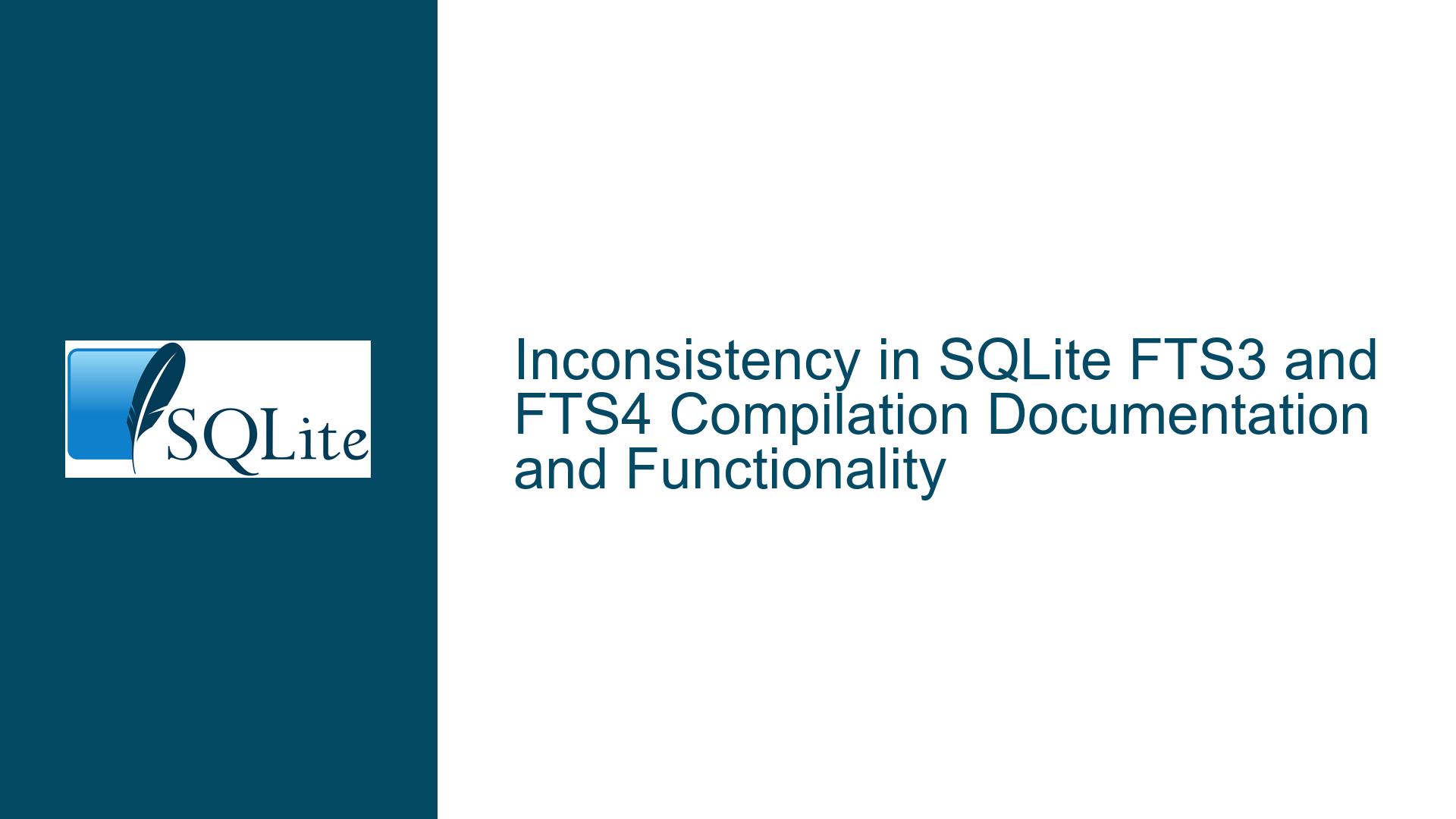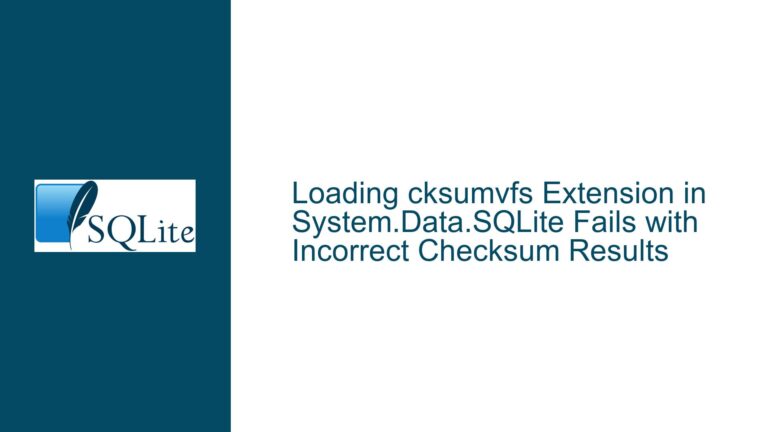Inconsistency in SQLite FTS3 and FTS4 Compilation Documentation and Functionality
Issue Overview: SQLite FTS3 and FTS4 Compilation Flags and Documentation Discrepancies
The core issue revolves around the confusion and inconsistency in the SQLite documentation regarding the compilation flags SQLITE_ENABLE_FTS3 and SQLITE_ENABLE_FTS4. The documentation on the SQLite website presents conflicting information about how these flags enable Full-Text Search (FTS) versions 3 and 4. Specifically, the FTS3 documentation states that enabling FTS3 also makes FTS4 available, implying that there is no separate SQLITE_ENABLE_FTS4 compile-time option. However, the compilation options page defines both SQLITE_ENABLE_FTS3 and SQLITE_ENABLE_FTS4, with the latter being described as an alias for the former. This discrepancy has led to confusion among developers, particularly those relying on the documentation to configure their SQLite builds for FTS functionality.
Further complicating the matter is the behavior observed in the System.Data.SQLite library, where enabling SQLITE_ENABLE_FTS3 does not automatically enable FTS4 functionality. Instead, FTS4 fails to work unless SQLITE_ENABLE_FTS4 is explicitly set. This behavior contradicts the documentation, which suggests that FTS4 should be available when FTS3 is enabled. The issue is further exacerbated by the fact that the SQLite amalgamation source code comments indicate that SQLITE_ENABLE_FTS4 is merely an alias for SQLITE_ENABLE_FTS3, implying that both flags should enable the same functionality. However, empirical evidence from developers using System.Data.SQLite suggests that this is not the case, leading to functional differences in FTS4 support depending on which flag is used.
The confusion is not merely academic; it has practical implications for developers who need to ensure that their SQLite builds support the required FTS functionality. For instance, developers who rely on FTS4-specific features may find that their applications fail to function correctly if they only enable SQLITE_ENABLE_FTS3, despite the documentation suggesting that this should be sufficient. This issue is particularly problematic for developers using libraries like System.Data.SQLite, where the behavior of the FTS flags may differ from the standard SQLite amalgamation.
Possible Causes: Misalignment Between Documentation, Code, and Implementation
The root cause of this issue appears to be a misalignment between the SQLite documentation, the amalgamation source code, and the actual implementation in libraries like System.Data.SQLite. The documentation suggests that SQLITE_ENABLE_FTS3 should enable both FTS3 and FTS4, with SQLITE_ENABLE_FTS4 serving as an alias. However, the behavior observed in System.Data.SQLite indicates that this is not the case, and FTS4 functionality is only available when SQLITE_ENABLE_FTS4 is explicitly enabled. This discrepancy suggests that the documentation may not accurately reflect the behavior of all SQLite implementations, particularly those that are not part of the standard amalgamation.
Another possible cause is the evolution of the SQLite codebase over time. The comments in the amalgamation source code suggest that SQLITE_ENABLE_FTS4 was introduced as an alias for SQLITE_ENABLE_FTS3 to avoid confusion. However, it is possible that this change was not consistently applied across all SQLite implementations, leading to differences in behavior between the standard amalgamation and third-party libraries like System.Data.SQLite. This inconsistency could be the result of differences in how these libraries handle the compilation flags, or it could be due to changes in the SQLite codebase that were not fully documented or communicated.
Additionally, the issue may be exacerbated by the fact that FTS4 is an extension of FTS3, meaning that it builds on the functionality provided by FTS3. This relationship could lead to confusion about whether enabling FTS3 should automatically enable FTS4, or whether FTS4 requires separate configuration. The documentation’s assertion that enabling FTS3 also enables FTS4 may have been true at one point, but changes in the codebase or differences in implementation could have introduced the observed discrepancies.
Finally, the issue could be related to the way the SQLite compilation flags are processed during the build process. If the flags are not handled consistently across different build configurations or platforms, this could lead to differences in the functionality that is enabled. For example, the behavior of the flags in the standard SQLite amalgamation may differ from their behavior in third-party libraries like System.Data.SQLite, leading to the observed inconsistencies.
Troubleshooting Steps, Solutions & Fixes: Resolving FTS3 and FTS4 Compilation Issues
To address the inconsistencies between the SQLite documentation and the observed behavior in System.Data.SQLite, developers should take the following steps to ensure that their builds support the required FTS functionality:
Verify Compilation Flags: The first step is to verify which FTS compilation flags are enabled in your SQLite build. This can be done by querying the
PRAGMA compile_options;statement, which returns a list of all the compile-time options that were used when the SQLite library was built. Developers should check whetherENABLE_FTS3andENABLE_FTS4are present in the list of options. If onlyENABLE_FTS3is present, this could explain why FTS4 functionality is not available.Explicitly Enable FTS4: If FTS4 functionality is required, developers should explicitly enable the
SQLITE_ENABLE_FTS4flag during the build process. This is particularly important when using libraries like System.Data.SQLite, where enablingSQLITE_ENABLE_FTS3may not be sufficient to enable FTS4. By explicitly enablingSQLITE_ENABLE_FTS4, developers can ensure that the necessary FTS4 features are available in their build.Rebuild SQLite with Correct Flags: If the required FTS functionality is not available, developers may need to rebuild SQLite with the correct compilation flags. This involves downloading the SQLite amalgamation source code, configuring the build with the appropriate flags (
SQLITE_ENABLE_FTS3and/orSQLITE_ENABLE_FTS4), and then compiling the library. This step is particularly important for developers using custom builds of SQLite, as precompiled binaries may not include the required FTS features.Check Library-Specific Behavior: Developers using third-party libraries like System.Data.SQLite should be aware that the behavior of the FTS compilation flags may differ from the standard SQLite amalgamation. In such cases, it is important to consult the library’s documentation or test the behavior empirically to ensure that the required FTS functionality is available. If the library does not support the expected behavior, developers may need to switch to a different library or use a custom build of SQLite.
Update Documentation: While this step is outside the control of individual developers, it is worth noting that the SQLite documentation should be updated to reflect the current behavior of the FTS compilation flags. This would help to avoid confusion and ensure that developers have accurate information when configuring their builds. Developers who encounter discrepancies between the documentation and the observed behavior should consider reporting these issues to the SQLite maintainers.
Test FTS Functionality: After enabling the appropriate compilation flags and rebuilding SQLite, developers should thoroughly test the FTS functionality to ensure that it behaves as expected. This includes testing both FTS3 and FTS4 features, particularly if the application relies on FTS4-specific functionality. Testing should be done in a controlled environment to ensure that any issues are identified and resolved before deploying the application.
Consider Alternative Solutions: If the issues with FTS3 and FTS4 cannot be resolved, developers may need to consider alternative solutions. This could include using a different full-text search engine, or implementing custom search functionality within the application. While this may require additional development effort, it could provide a more reliable solution in cases where the SQLite FTS functionality does not meet the application’s requirements.
By following these steps, developers can resolve the inconsistencies between the SQLite documentation and the observed behavior in System.Data.SQLite, ensuring that their builds support the required FTS functionality. While the issue is primarily related to documentation and compilation flags, it has significant implications for developers who rely on SQLite’s full-text search capabilities. Taking a proactive approach to verifying and configuring the FTS compilation flags can help to avoid potential issues and ensure that the application functions as expected.






